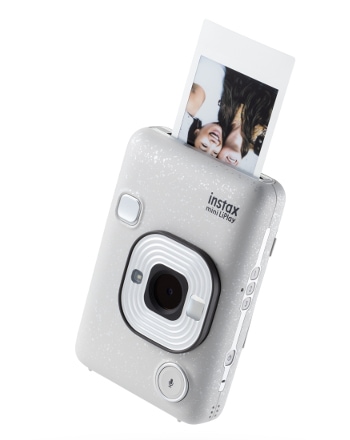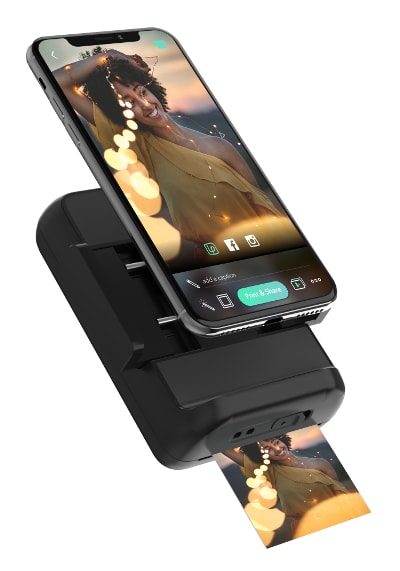Digital instant cameras, also called hybrid instant cameras, offer some advantages that buyers of analog Polaroid cameras are denied. Meanwhile, there are a number of models on the market, although the range of functions can vary considerably. Those who buy uninformed might experience a nasty surprise. In this article we explain what makes a digital instant camera and which differences have to be considered. Click here to go directly to the overview list!
The difference between analog and digital instant cameras

Instax Mini Liplay © Fujifilm
Analog instant cameras such as the Fujifilm Instax Mini 11 or the Polaroid Now are once again enjoying great popularity. After this type of photography had almost died out at the end of the 00’s, there are now countless models on the market again. For many, the charm of a classic analog instant camera lies in the fact that the photo taken is unique. It is not possible to reproduce it (without great effort). This is where digital instant cameras come into play. They offer the possibility to save the taken pictures on a memory card in addition to immediate printing. Thus, the pictures can be printed out several times, passed on or edited on other media. Ultimately, the choice between analog and digital is a matter of taste when buying an instant camera.
Advantages of digital instant cameras
Apart from the obvious advantage of permanent storage of the images, the hybrids offer several other advantages over the analog competition:
- Images can be printed multiple times
- Depending on the camera, the images can be edited in advance
- Cost-saving, because only successful images are printed
- Possibility to publish the pictures on Instagram & Co.
- No dependence on film
Why the comparison is worthwhile

into an instant cam © Lifeprint
It is true that all digital instant cameras have in common that the photos are also available in digital form after being taken. However, there are serious differences between the models. For example, with the Kodak Printomatic instant picture camera, the printing of the picture cannot be prevented. This means that as long as there is a film in the camera, a picture is also printed each time the shutter is released. Also different films like Zink photo paper or the Instax Mini film are used. This is accompanied by a different image size – a real matter of taste. The following questions should help you find the ideal digital instant camera:
- Which film will be used?
- What is the image format of the instant camera?
- Do I need filters for my photos?
- Which memory card is supported?
- Is an image printed each time the shutter is released?
- How many megapixels does the camera have?
- Does the instant camera have an associated app?
Comparison of current digital instant cameras
Here you can find current digital instant cameras from various manufacturers. We have taken a closer look at linked models on Sofortbildkamera.org:
| Digital Instant Cameras | Film | Megapixel | Picture Size / Format | Memory | Miscellaneous |
|---|---|---|---|---|---|
| Fujifilm Instax Mini Liplay | Instax Mini | 5 MPX | 2.4 x 1.8 inch / approx. 3:2 | Micro SD od. Micro SDHC | App; Sound record for images |
| Kodak Printomatic | Zink Paper | 10 MPX | 2 x 3 inch / 2 x 3 | Micro SD | Printing cannot be prevented |
| Canon Zoemini S | Zink Paper | 8 MPX | 2 x 3 inch / 2 x 3 | Micro SD | App; Ringflash |
| Lifeprint for iPhone | Zink Paper | - | 2 x 3 inch / 2 x 3 | Micro SD | Add-On iPhone Camera; Augmented Reality Photoprinter Feature |
| Fujifilm Instax SQ20 | Instax SQUARE | 3.7 MPX | 2. 4 x 2.4 inch / 1:1 | Micro SD od. Micro SDHC | 6 Image Modes |
| Polaroid Snap | Zink Paper | 10 MPX | 2 x 3 inch / 2 x 3 | Micro SD | |
| Polaroid Mint | Zink Paper | 16 MPX | 2 x 3 inch / 2 x 3 | Micro SD |
CONCLUSION
Digital instant cameras fill a gap between classic digital cameras and analog instant cameras. And the advantages cannot be denied. Especially when it comes to the cost per picture, classic instant photography is a very special way of taking pictures. Motifs are selected more carefully and the photo is naturally more highly valued. Here digital instant photography is more carefree. You shoot photos as you please and in case of doubt you decide later which pictures should actually be printed. Both ways of taking pictures have their charm. The rest is a matter of taste.